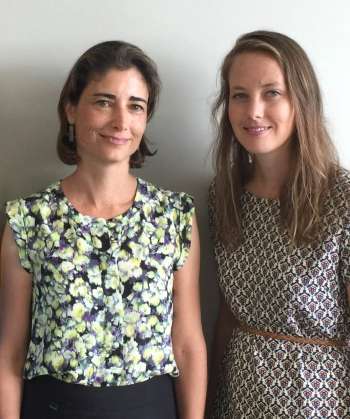Associate Professor Elizabeth Broadbent with her student, PhD Candidate Hayley Robinson. Credit: University of Auckland
People who wrote emotionally about past stressful events two weeks before having a biopsy had their wound heal faster than people who wrote about factual day to day activities, a study has found.
The study, "The effects of expressive writing before or after punch biopsy on wound healing", was published in the journal Brain, Behaviour and Immunity.
The research was conducted by Doctoral Candidate Hayley Robinson and Associate Professor Elizabeth Broadbent of the University of Auckland's Faculty of Medical and Health Sciences. They were joined by Professor Kavita Vedhara of the University of Nottingham and dermatologist Dr Paul Jarrett of Counties Manukau DHB.
The aim of the study was to investigate whether expressive writing could speed the healing of punch biopsy wounds if writing was performed either before or after wounds were made compared to writing about neutral topics.
The study recruited 122 participants from Auckland aged between 18 and 55 years that were randomly allocated to one of four groups, expressive writing pre biopsy or expressive writing post biopsy, or control writing pre biopsy, or control writing post biopsy.
The expressive writing groups were asked to write about their "deepest thoughts and feelings about a traumatic, upsetting experience of your entire life". Ideally participants were to write about something they had not discussed in great detail with anyone else.
The control groups were asked to write factually about their daily activities.
A dermatologist performed a 4mm punch biopsy to each participant's inner upper arm.
After 10 days the results showed that 52 percent of the people who had written expressively before the biopsy were healed, while only 27 percent of people who wrote expressively afterward the biopsy had healed.
The results were worse for the two groups that wrote facts without emotion. Only 15 percent in the controlled writing before the biopsy had healed. And for those who wrote about the control topic after the biopsy, only 23 percent had healed.
Hayley says the results suggest that expressive writing has its greatest effects when it occurs prior to an acute wound.
"This is because the writing initially makes you feel worse before you feel better," she says.
"So ideally you have finished writing and are starting to feel better during the period when your wound is healing. The results are important because they suggest that when you write is important, not just what you write about.
"Future research needs to look at the effects of expressive writing on the healing of chronic wounds, when writing can only be done after the wound has occurred," Dr Broadbent says.
More information: Hayley Robinson et al. The effects of expressive writing before or after punch biopsy on wound healing, Brain, Behavior, and Immunity (2017). DOI: 10.1016/j.bbi.2016.11.025
Journal information: Brain, Behavior, and Immunity
Provided by University of Auckland























